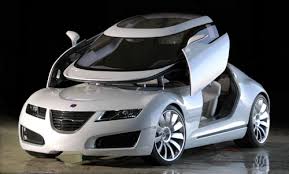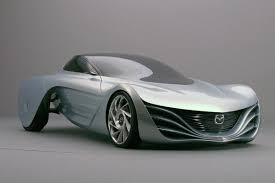The British company Prodrive envisioned a new concept for a vehicle with an enclosed body and the width of a motorcycle. Its concept Naro however has four wheels and works with a tilting mechanism to prevent it from tipping over in curves in the road.
Naro: "NARROW CITY VEHICLE" is a city vehicle designed to diminish the traffic congestion and pollution in urban areas. With its narrow body, the four-wheeled Naro is able to drive through traffic congestions much in the same way as a motorcycle. The two passengers sit behind one and another in the fully enclosed body, which offers a passive safety level comparable to a small modern passenger car. The front-positioned driver however sits higher above ground level and therefore has a better view over the road.
A conventional four-wheeled vehicle with a similar narrow track and high centre of gravity would tend to fall over sideways when turning at high speeds. To avoid this problem, the Naro is equipped with a carving mechanism which makes all four wheels and the body tilt sideways during cornering. The amount of tilt during cornering depends on the driving speed.
Prodrive envisions various applications for the Naro, including a passenger vehicle, city taxi and delivery vehicle. The company has completed a first prototype and is conducting road-tests during 2006.
Another enclosed motorcycle concept is in development by a European consortium, on initiative of the Technical University in Berlin, Institute for Motor Vehicles. This three-wheeled vehicle, named CLEVER (Compact Low Emission Vehicle for Urban Transport), is designed as a city vehicle for two people, which requires little space, has a low weight, a low fuel consumption and low emissions.
The CLEVER (Compact Low Emission Vehicle for Urban Transport) is a compact city vehicle for two people, which requires little space and has a low weight. In turn, the vehicle requires just a small engine in order to reduce fuel consumption and exhaust emissions. The CLEVER is under development by a European consortium, on initiative of the Technical University in Berlin, Institute for Motor Vehicles. In 2006 a prototype vehicle was built by the University of Bath in Great Britain.
he two occupants sit behind one another in the streamlined, narrow cabin. To prevent the danger of tipping over, the cabin of the vehicle is designed to tilt when cornering. The CLEVER is driven by a single-cylinder engine of 230 cc displacement, running on natural gas.
TECHNICAL SPECIFICATIONS:
DRIVE SYSTEM:
Direct drive with single-cylinder 230 cc engine
POWER OUTPUT: 12.5 kW (17 hp) @ 8,600 rpm
FUEL: Natural gas
FUEL CONSUMPTION: 2.4 l / 100 km (98 mpg US)
ACCELERATION 0 – 60 KM/H (37 MPH): 7.0 sec.
MAXIMUM SPEED: 100 km/h (62 mph)
TECHNICAL SPECIFICATIONS:
DRIVE SYSTEM:
Direct drive with single-cylinder 230 cc engine
POWER OUTPUT: 12.5 kW (17 hp) @ 8,600 rpm
FUEL: Natural gas
FUEL CONSUMPTION: 2.4 l / 100 km (98 mpg US)
ACCELERATION 0 – 60 KM/H (37 MPH): 7.0 sec.
MAXIMUM SPEED: 100 km/h (62 mph)




















